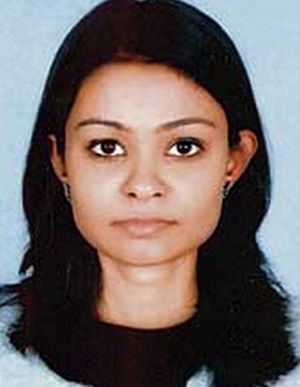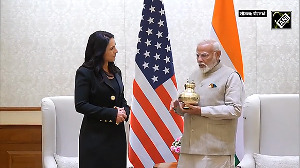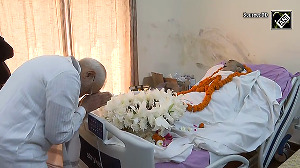 A Delhi court on Monday awarded death penalty to two convicts and life term to another for robbing and killing IT executive Jigisha Ghosh here in 2009, observing that it was a “brutal” and “cold blooded murder”.
A Delhi court on Monday awarded death penalty to two convicts and life term to another for robbing and killing IT executive Jigisha Ghosh here in 2009, observing that it was a “brutal” and “cold blooded murder”.
“To be hanged by neck till death,” Additional Sessions Judge Sandeep Yadav said, while awarding death to convicts Ravi Kapoor and Amit Shukla.
The judge also observed that gruesome crimes against women were on the rise and any leniency to the criminals would send a wrong message to society.
“The offence was committed in a brutal, cold blooded and cruel manner. The victim was helpless and remained in captivity for hours and the convicts brutally mauled her to death. It was an uncivilised act done in a barbaric manner.
“The magnitude and brutality of the crime makes it fall in the category of rarest of rare,” the judge said.
Besides Ravi and Amit, the court sentenced Baljeet to life imprisonment.
Jigisha, 28, working as an operations manager in a management consultancy firm, was abducted and killed on March 18, 2009 after she was dropped by her office cab around 4 am near her home in Vasant Vihar area of South Delhi.
Her body was recovered three days later from a place near Surajkund in Haryana, police had said.
While awarding the death penalty, the court said according to the pre-sentencing report, there was “no scope for Ravi Kapoor and Amit Shukla to reform”.
As per the report, Baljeet’s conduct was normal and there was no complaint against him and he was not a threat to society.
The court also imposed a total fine of Rs nine lakh on the three convicts, who were present at the hearing, out of which Rs six lakh is to be given to the victim’s family as compensation.
It also said this amount was not adequate and asked the legal aid authority to decide appropriate compensation for the victim’s family.
“The pain, agony and trauma of victim’s parents cannot be compensated,” the court observed.
The court had on July 14 convicted the three men, saying it was “abundantly clear” that they had committed the crime.
The court had said it was proved that the three convicts had abducted Jigisha, robbed her of her gold chain, two mobile phones, two rings, debit and credit cards and killed her.
The court had on August 20 reserved the order on sentence after the arguments concluded and a PSR was submitted by probationary officer.
While seeking death sentence for the convicts, Special Public Prosecutor Rajiv Mohan had argued that they abducted Jigisha, robbed her, killed her and used her debit card for shopping, and a CCTV footage of their shopping showed they had no remorse for their act.
Advocate Amit Kumar, appearing for convicts Baljeet and Amit Shukla, had argued that his clients have already spent over seven years in jail and maintained good conduct.
The counsel for convict Ravi Kapoor sought leniency for his client, saying he was suffered from a life threatening disease and belonged to a poor family.
The police had filed the charge sheet in the case in June 2009 and trial began on April 15, 2010.
Recovery of the weapon allegedly used in Jigisha’s murder had led to the cracking of the murder case of Soumya Vishwanathan, who was a journalist with a news channel.
Soumya was shot dead on September 30, 2008 while she was returning home in her car from office in the wee hours.
Police had claimed robbery as the motive behind the killing of both Jigisha and Soumya.
The accused had used Jigisha’s ATM card to buy expensive goggles, wrist watches and shoes from Sarojini Nagar market in South Delhi, police had said.











 © 2025
© 2025